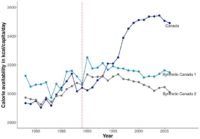27 Mar US Free Trade Agreements Can Contribute to “Globesity”
MedicalResearch.com Interview with:

Trends in calorie availability in Canada and synthetic controls, 1978-2006. Data from the United Nations Food and Agricultural Office (2016). ‘Synthetic controls’ are constructed from a weighted combination of OECD countries, where weights correspond to the similarity of each country with Canada before CUSFTA.
Credit:
American Journal of Preventive Medicine
Pepita Barlow, MSc, Department of Sociology
University of Oxford, Manor Road Building, Manor Road,
Oxford, United Kingdom
MedicalResearch.com: What is the background for this study? What are the main findings?
Response: The escalating global prevalence of overweight and obesity, or “globesity,” is often described as a pandemic. Globalization via free trade agreements (FTAs) with the US has been implicated in this pandemic because of its role in spreading high-calorie diets rich in salt, sugar, and fat through the reduction of trade barriers like tariffs in the food and beverage sector.
We used a “natural experiment” design (that mimics a randomized controlled trial as closely as possible) and data from the United Nations Food and Agricultural Office to evaluate the impact of the 1989 Canada-US Free Trade Agreement on caloric availability in Canada (CUSFTA).
We found that CUSFTA was associated with an increase in caloric availability and likely intake of approximately 170 kilocalories per person per day in Canada. Additional models showed that this rise in caloric intake can contribute to weight gain of between 1.8-9.3 kg for men and 2.0-12.2 kg for women aged 40, depending on their physical activity levels and the extent to which availability affects caloric intake.
MedicalResearch.com: What should readers take away from your report?
Response: Our study shows that US free trade and investment agreements can contribute to rising obesity and related diseases by encouraging higher up caloric intake. This is likely to have occurred by spreading the unhealthy ‘obesogenic’ food environment that pertains to the US to Canada.
MedicalResearch.com: What recommendations do you have for future research as a result of this work?
Response: There are several potential directions for future research. One is to evaluate the socio-economic groups in whom the impact of US FTAs on diets and obesity are concentrated.
Another recommendation for future research is to evaluate whether the extent to which US FTAs influence diets could be mitigated by obesity prevention strategies or other public policies.
Finally, it is necessary to investigate the potentially beneficial impacts of FTAs. This will allow us to develop a more detailed understanding of the ways in which trade agreements can be designed so as to maximize their health benefits and minimize their harms.
MedicalResearch.com: Is there anything else you would like to add?
Response: This paper is of great relevance to current debates about a potential US-UK trade deal following Brexit and its implications for obesity prevention in the UK, the possible renegotiation of NAFTA in Canada, and the forging of new US trade deals in many other parts of the world.
Our study suggests that these trade deals may have a deleterious impact on population diets and obesity when they are implemented in countries where food supplies are already adequate to meet food demand. By doing so, our study also highlights the need for greater coherence between nutrition and trade policy-making if governments wish to minimize the potentially deleterious impacts of FTAs on population health – and maximize their health benefits.
No disclosures
Citations:
The Impact of U.S. Free Trade Agreements on Calorie Availability and Obesity: A Natural Experiment in Canada
Pepita Barlow, Martin McKee, David Stuckler
DOI: https://doi.org/10.1016/j.amepre.2018.02.010
Publication stage: In Press Corrected Proof
Published online: March 26, 2018
[wysija_form id=”3″]
The information on MedicalResearch.com is provided for educational purposes only, and is in no way intended to diagnose, cure, or treat any medical or other condition. Always seek the advice of your physician or other qualified health and ask your doctor any questions you may have regarding a medical condition. In addition to all other limitations and disclaimers in this agreement, service provider and its third party providers disclaim any liability or loss in connection with the content provided on this website.
Last Updated on March 27, 2018 by Marie Benz MD FAAD
